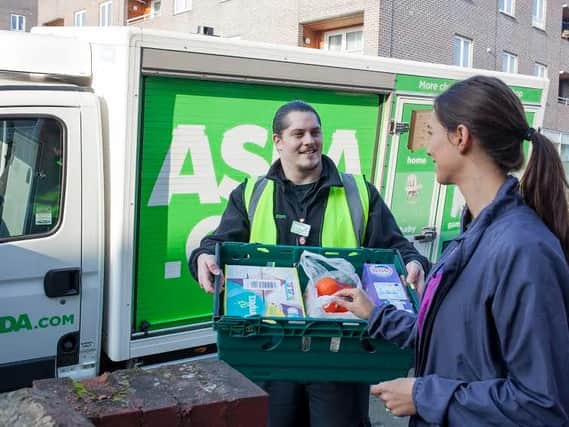High street grocery sales leap nearly 6 per cent reflecting rising consumer confidence


The latest figures from Kantar also show that Leeds-based Asda was the fastest growing of the big four retailers for the first time in nearly two and a half years.
Its larger stores were visited less often by shoppers looking to stay local in the early days of the pandemic, but footfall has now returned strongly. Asda saw an 8 per cent rise in sales over the 12 week period.
Advertisement
Hide AdAdvertisement
Hide AdFraser McKevitt head of retail and consumer insight at Kantar, said the main reason for Asda's strong comeback is that last year, shoppers were going to convenience stores and were avoiding large stores in order to reduce the risk of becoming infected by Covid-19.
"Asda's sales have bounced back and you can see the footfall coming back to Asda much stronger than to any of the other retailers," he said.
"Much of the last year wasn't conducive to Asda amid the pandemic, so it is now on a much more positive footing."
The latest figures from Kantar show take-home grocery sales rose 5.7 per cent during the 12 weeks to April 18.
Advertisement
Hide AdAdvertisement
Hide AdMr McKevitt said: “There is a growing sense that the worst of the pandemic is behind us, and people are becoming more comfortable with venturing out to the supermarket.
"The past four weeks have been the busiest in store for the grocers in more than a year, as the number of trips made in April increased by 4 per cent compared to March.
"With much of the over-65 community now vaccinated, older shoppers accounted for nearly half of the increased footfall."
Mr McKevitt said the return to overall sales growth in the latest four week period reflects what was happening in April 2020, a highly unusual month for grocery shopping. "After the initial pre-lockdown rush, this time last year was comparatively quiet," he said.
Advertisement
Hide AdAdvertisement
Hide Ad"Shoppers chose to buy locally and limit their trips to stores where possible, which is reflected by strong growth a year later.
"While the market may fluctuate between growth and decline in the months ahead, depending on the year-on-year comparison being made, the fact that trip numbers are up and basket sizes down suggests that habits are slowly returning to normal.”
April also saw the long awaited reopening of pubs, restaurants and non-essential retail in some parts of Britain.
Early signs suggest that shoppers were particularly eager to visit fashion retailers, and on April 12, spending on clothes was double the typical pre-pandemic level, as well as being greater than when stores reopened after the first lockdown in 2020.
Advertisement
Hide AdAdvertisement
Hide AdMr McKevitt said: “The return of wider retail and hospitality will naturally have a knock-on effect for the grocers.
"For example, sales of alcohol grew by just 1 per cent in the latest four weeks, as people now have the option of eating and drinking out of the home again.
"That said, the easing of restrictions was clearly a cause for celebration at home too. Take-home sales of sparkling wine increased by 48 per cent, suggesting that many raised a toast with friends and family in the garden or the park.”
The number of people shopping online in the past month fell for the second time in a row.
Advertisement
Hide AdAdvertisement
Hide AdMr McKevitt said: “The share of groceries ordered via the internet in the most recent four weeks slipped to 13.9 per cent, down from a peak of 15.4 per cent in February.
"While online is still growing strongly, at 46 per cent, the rate is half what it was at the height of the pandemic.
"Convenience stores – both independents and those owned by major retailers – were also particularly popular during the first lockdowns and, against such comparisons, it is unsurprising that sales have fallen by 19 per cent in the past month.”
Market leader Tesco's sales rose 6.4 per cent over the 12 weeks and Bradford-based Morrisons' sales rose 7.2 per cent. Sainsbury’s sales climbed 6.0 per cent.
Comment Guidelines
National World encourages reader discussion on our stories. User feedback, insights and back-and-forth exchanges add a rich layer of context to reporting. Please review our Community Guidelines before commenting.